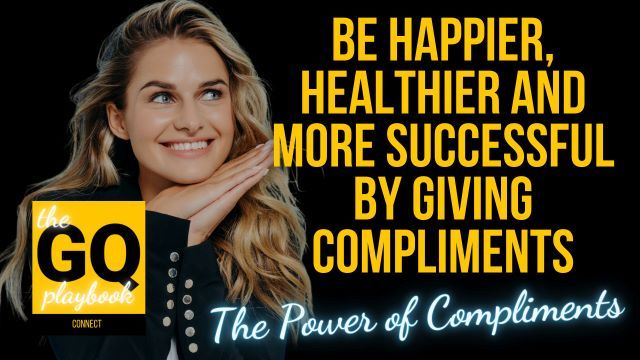Think about the last time someone gave you
a compliment. How did it make you feel? Chances are, it made you feel pretty
good. Now, think about the last time you gave someone a compliment. Again, how
did that make you feel? If you're like most people, giving a compliment
probably made you feel just as good as receiving one.
That's because compliments are powerful.
Compliments have the power to connect. Compliments have the ability to make
people feel happy, appreciated, and valued. And when people feel happy,
comfortable, appreciated, respected, loved, and valued, they're more likely to
be successful in all areas of their lives.
There's science to back up the assertion
that compliments can make you happier and more successful. Studies have shown
that compliments increase levels of oxytocin, also known as the "love
hormone." Oxytocin is associated with happiness, stress relief, and even
pain relief. Oxytocin is also thought to promote bonding and trust between
people.
In addition to making us feel good on an
emotional level, compliments also have the power to increase our motivation and
productivity levels. That's because when we receive compliments, our brains
release dopamine—a chemical that's associated with pleasure and reward.
Dopamine has been shown to increase levels of focus and concentration. It's
also thought to play a role in memory formation and retrieval.
When you pay someone a compliment, it helps to build a better
connection because it shows that you are interested in them and care about
their well-being. It also makes the other person feel good about themselves,
which can lead to more positive interactions between the two of you.
Ultimately, paying someone a compliment can help create a strong foundation for
a lasting friendship, business relationship, or affiliation.
Paying someone a compliment usually makes them feel good. It
can make the person feel appreciated and boost their self-esteem. Compliments
can also make the recipient feel happy and more positive about themselves,
which can lead to them having a better day overall. And, when that happens,
chances are you'll feel better as well!
Now that we know how powerful compliments
can be, let's talk about how we can start giving them more often.
If your compliment doesn't come from a
place of sincerity, the recipient will be able to tell, and it will do more
harm than good. When you give a compliment, make sure it's something that you
actually mean.
For example, instead of saying "Great
job!" try something like "I really appreciate the hard work you put
into this project – especially when you delivered the reports on time." A
specific compliment shows that you're genuinely paying attention and that you
value the other person's efforts.
A few genuine compliments are usually
better than a bunch of insincere ones. Too many compliments can also make you
seem insincere or even desperate.
Empty flattery is when you give someone a
compliment simply for the sake of giving them a compliment with no real meaning
behind it. For example, "You're so beautiful!" is an empty flattery.
Not only is empty flattery insincere, but it can also make the recipient feel
uncomfortable or even insulted. Instead be specific, for example "I love
your new haircut!" or "the color lavender looks great on you!"
The Inner Genius Profile and tools
help with connection because it provides a framework for understanding yourself
and others. Unlocking your Inner Genius helps you to communicate more
effectively and to create deeper connections with others. The profile can help
you to learn more about yourself, your Genius Zone, and how you can best
connect with others. The tools can help you to supercharge your communication
and influence others in a positive way, and to create more meaningful
relationships.



